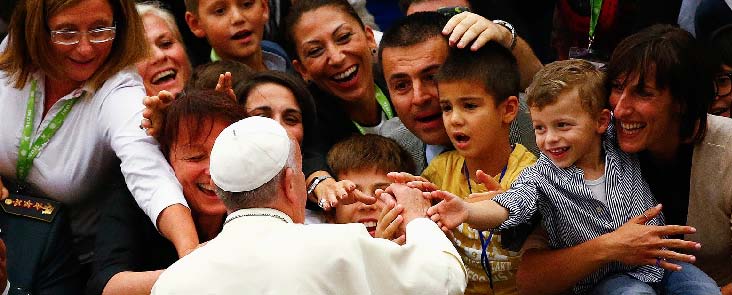
“Go into all the world!
Go! Preach! Bear witness to the Gospel!”
(see Mark 16:15)
By Pope Francis
The Church must step outside herself. To go where? To the outskirts of existence, whatever they may be, but she must step out. Jesus tells us, “Go into all the world! Go! Preach! Bear
witness to the Gospel!” (see Mark 16:15). But what happens if we step outside ourselves? The same as can happen to anyone who comes out of the house and onto the street: an accident. But I tell you, I far prefer a Church that has had a few accidents to a Church that has fallen sick from being closed. Go out, go out!
Think of what the book of Revelation says as well. It says something beautiful: that Jesus stands at the door and knocks, knocks to be let into our heart (see Rev. 3:20). This is the meaning of the book of Revelation. But ask yourselves this question: how often is Jesus inside and knocking at the door to be let out, to come out? And we do not let him out because of our own need for security, because so often we are locked into ephemeral structures that serve solely to make us slaves and not free children of God.
In this “stepping out” it is important to be ready for encounter. For me this word is very important. Encounter with others. Why? Because faith is an encounter with Jesus, and we must do what Jesus does: encounter others. We live in a culture of conflict, a culture of fragmentation, a culture in which I throw away what is of no use to me, a culture of waste. Yet on this point, I ask you to think—and it is part of the crisis—of the elderly, who are the wisdom of a people; think of the children…the culture of waste! However, we must go out to meet them, and with our faith we must create a “culture of encounter,” a culture of friendship, a culture in which we find brothers and sisters, in which we can also speak with those who think differently, as well as those who hold other beliefs, who do not have the same faith. They all have something in common with us: they are images of God; they are children of God. [We must be] going out to meet everyone, without losing sight of our own position.
There is another important point: encountering the poor. If we step outside ourselves, we find poverty. Today—it sickens the heart to say so—the discovery of a tramp who has died of the cold is not news. Today what counts as news is, maybe, a scandal. A scandal—ah, this is news! Today, the thought that a great many children do not have food to eat is not news. This is serious; this is serious! We cannot put up with this! Yet that is how things are.
We cannot become starched Christians, those overeducated Christians who speak of theological matters as they calmly sip their tea. No! We must become courageous Christians and go in search of the people who are the very flesh of Christ—those who are the flesh of Christ! When I go to hear confessions—I still can’t, because to go out to hear confessions…from here it’s impossible to go out, but that’s another problem—when I used to go to hear confessions in my previous diocese, people would come to me, and I would always ask them: “Do you give alms?” “Yes, Father!” “Very good.” And I would ask them two further questions: “Tell me, when you give alms, do you look the person in the eye?” “Oh, I don’t know. I haven’t really thought about it.” The second question: “And when you give alms, do you touch the hand of the person you are giving them to, or do you toss the coin at him or her?” This is the [issue]: the flesh of Christ, touching the flesh of Christ, taking upon ourselves this suffering for the poor.
Poverty for us Christians is not a sociological, philosophical, or cultural category, no. It is theological. I might say this is the first category, because our God, the Son of God, abased himself, he made himself poor to walk along the road with us. This is our poverty; the poverty of the flesh of Christ, the poverty that brought the Son of God to us through his incarnation. A poor Church for the poor begins by reaching out to the flesh of Christ. If we reach out to the flesh of Christ, we begin to understand something, to understand this poverty, the Lord’s poverty.

Excerpt from The Church of Mercy by Pope Francis (Loyola Press 2014). Reprinted with permission from Loyola Press. To order copies of this book, visit PopeFrancis.LoyolaPress.com.
Click here for Partners Fall/Winter 2014 Index